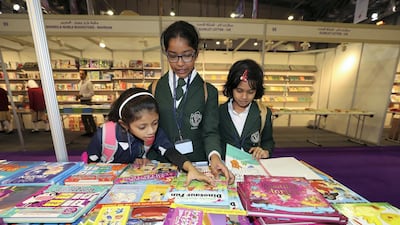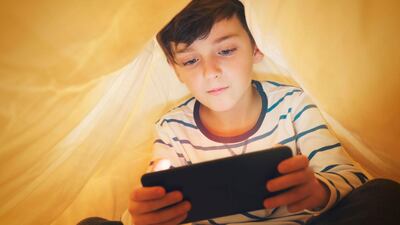More than a third of families living in Sharjah do not monitor the online activities of their children, according to a recent study.
The emirate's Child Safety Department's (CSD) survey of more than 12,000 families over 14 months found that 37.6 per cent of respondents left their children to their own devices online.
However, the survey also showed that 10.4 per cent of parents did not allow their children to access the internet at all, while 23.5 per cent offered them internet access "only sometimes".
More than half of parents polled – 55 per cent – used parental controls to monitor online activity and downloads.
But 7 per cent did not know such controls existed.
The websites most visited by children in the survey were YouTube and gaming platforms.
A representative sample was selected at random among Emirati and foreign resident families in 2018 and 2019.
"The data obtained will help the growth and prosperity of society, and ensure protection of its youngest members who are most vulnerable to online crimes and internet addiction," said Hanadi Saleh Al Yafei, director of the CSD.
Results also revealed behavioural changes observed by parents in their children, as a result of access to the internet.
The most significant was "intellectual development", according to respondents, while "academic achievement" was ranked as the least significant.
The study suggested partnering with nurseries and schools to develop programmes that raise awareness about e-safety and potential dangers online.
Data was collected by a field team from the Sharjah Department of Statistics and Community Development.
Sharjah children's reading festival
What's in the deal?
Agreement aims to boost trade by £25.5bn a year in the long run, compared with a total of £42.6bn in 2024
India will slash levies on medical devices, machinery, cosmetics, soft drinks and lamb.
India will also cut automotive tariffs to 10% under a quota from over 100% currently.
Indian employees in the UK will receive three years exemption from social security payments
India expects 99% of exports to benefit from zero duty, raising opportunities for textiles, marine products, footwear and jewellery
Navdeep Suri, India's Ambassador to the UAE
There has been a longstanding need from the Indian community to have a religious premises where they can practise their beliefs. Currently there is a very, very small temple in Bur Dubai and the community has outgrown this. So this will be a major temple and open to all denominations and a place should reflect India’s diversity.
It fits so well into the UAE’s own commitment to tolerance and pluralism and coming in the year of tolerance gives it that extra dimension.
What we will see on April 20 is the foundation ceremony and we expect a pretty broad cross section of the Indian community to be present, both from the UAE and abroad. The Hindu group that is building the temple will have their holiest leader attending – and we expect very senior representation from the leadership of the UAE.
When the designs were taken to the leadership, there were two clear options. There was a New Jersey model with a rectangular structure with the temple recessed inside so it was not too visible from the outside and another was the Neasden temple in London with the spires in its classical shape. And they said: look we said we wanted a temple so it should look like a temple. So this should be a classical style temple in all its glory.
It is beautifully located - 30 minutes outside of Abu Dhabi and barely 45 minutes to Dubai so it serves the needs of both communities.
This is going to be the big temple where I expect people to come from across the country at major festivals and occasions.
It is hugely important – it will take a couple of years to complete given the scale. It is going to be remarkable and will contribute something not just to the landscape in terms of visual architecture but also to the ethos. Here will be a real representation of UAE’s pluralism.
Veil (Object Lessons)
Rafia Zakaria
Bloomsbury Academic
INDIA SQUAD
Rohit Sharma (captain), Shikhar Dhawan (vice-captain), KL Rahul, Suresh Raina, Manish Pandey, Dinesh Karthik (wicketkeeper), Deepak Hooda, Washington Sundar, Yuzvendra Chahal, Axar Patel, Vijay Shankar, Shardul Thakur, Jaydev Unadkat, Mohammad Siraj and Rishabh Pant (wicketkeeper)
BACK%20TO%20ALEXANDRIA
%3Cp%3E%3Cstrong%3EDirector%3A%20%3C%2Fstrong%3ETamer%20Ruggli%3C%2Fp%3E%0A%3Cp%3E%3Cstrong%3EStarring%3A%20%3C%2Fstrong%3ENadine%20Labaki%2C%20Fanny%20Ardant%3C%2Fp%3E%0A%3Cp%3E%3Cstrong%3ERating%3A%20%3C%2Fstrong%3E3.5%2F5%3C%2Fp%3E%0A
SHAITTAN
%3Cp%3E%3Cstrong%3EDirector%3A%20%3C%2Fstrong%3EVikas%20Bahl%3Cbr%3E%3Cstrong%3EStarring%3A%20%3C%2Fstrong%3EAjay%20Devgn%2C%20R.%20Madhavan%2C%20Jyothika%2C%20Janaki%20Bodiwala%3Cbr%3E%3Cstrong%3ERating%3A%20%3C%2Fstrong%3E3%2F5%3C%2Fp%3E%0A
The biog
Profession: Senior sports presenter and producer
Marital status: Single
Favourite book: Al Nabi by Jibran Khalil Jibran
Favourite food: Italian and Lebanese food
Favourite football player: Cristiano Ronaldo
Languages: Arabic, French, English, Portuguese and some Spanish
Website: www.liliane-tannoury.com
SPECS
%3Cp%3E%3Cstrong%3EEngine%3C%2Fstrong%3E%3A%202-litre%20direct%20injection%20turbo%20%0D%3Cbr%3E%3Cstrong%3ETransmission%3C%2Fstrong%3E%3A%207-speed%20automatic%20%0D%3Cbr%3E%3Cstrong%3EPower%3C%2Fstrong%3E%3A%20261hp%20%0D%3Cbr%3E%3Cstrong%3ETorque%3C%2Fstrong%3E%3A%20400Nm%20%0D%3Cbr%3E%3Cstrong%3EPrice%3C%2Fstrong%3E%3A%20From%20Dh134%2C999%26nbsp%3B%3C%2Fp%3E%0A
The specs: 2019 Jeep Wrangler
Price, base: Dh132,000
Engine: 3.6-litre V6
Gearbox: Eight-speed automatic
Power: 285hp @ 6,400rpm
Torque: 347Nm @ 4,100rpm
Fuel economy, combined: 9.6L to 10.3L / 100km
More from Neighbourhood Watch










